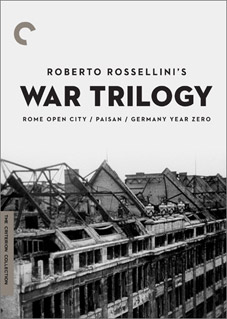Roberto Rossellini is one of world cinema's most influential filmmakers, and it was with his trilogy of films made during and after World War II – Rome Open City (Roma, città aperta), Paisan (Paisà), and Germany Year Zero (Germania anno zero) – that he left his first transformative mark on cinema. With their stripped-down aesthetic, largely nonprofessional casts, and unorthodox approaches to storytelling, these intensely emotional works were international sensations and effectively launched the neorealist movement. Shot in battle-ravaged Italy and Germany, these three films are some of our most lasting, humane documents of devastated postwar Europe, containing universal images that encompass both tragedy and hope.
Rome Open City (1945) was Roberto Rossellini's revelation, a harrowing drama about the Nazi occupation of Rome and the brave few who struggled against it. Rome Open City is a shockingly authentic experience, conceived and directed amid the ruin of World War II. The ambitious, enormously moving Paisan (1946) was Roberto Rossellini's follow-up to consists of six episodes set during the liberation of Italy at the end of World War II, taking place across the country, from Sicily to the northern Po Valley. The concluding chapter of Roberto Rossellini's War Trilogy Germany Year Zero (1948) is the most devastating, a portrait of an obliterated Berlin shown through the eyes of a twelve-year-old boy.

Roberto Rossellini's War Trilogy will be released as a 3 disc DVD box set by Criterion on 26th January 2009 at the SRP of $79.95. Featuring new restored high-definition digital transfers, the set will have the following extras:
- Video introductions by Roberto Rossellini to all three films, from 1963;
- New video interviews with Rossellini scholar Adriano Aprà, Rossellini's friend and confessor Father Virgilio Fantuzzi, and filmmakers Paolo and Vittorio Taviani;
- Audio commentary on Rome Open City by film scholar Peter Bondanella;
- Once Upon a Time... 'Rome Open City', a 2006 documentary on the making of this historic film, featuring rare archival material and footage of Anna Magnani, Federico Fellini, Ingrid Bergman, and many others;
- Rossellini and the City, a new documentary on Rossellini's use of the urban landscape in these films, by film scholar Mark Shiel;
- Excerpts from rarely seen videotaped discussions Rossellini had with faculty and students at Rice University in 1970 about his craft
- Into the Future, a new visual essay about the War Trilogy by film scholar Tag Gallagher
- Roberto Rossellini, a 2001 documentary by Carlo Lizzani, assistant director on Germany Year Zero, tracing Rossellini's career through archival footage and interviews with family members and collaborators, with tributes by filmmakers François Truffaut and Martin Scorsese;
- Letters from the Front: Carlo Lizzani on 'Germany Year Zero', a 1987 podium discussion with Lizzani
Italian credits and prologue for Germany Year Zero;
- New illustrated essay by film scholar Thomas Meder on Rossellini's relationship with his mistress Roswitha Schmidt;
- New and improved English subtitle translations;
- A booklet featuring essays by James Quandt, Irene Bignardi, Colin MacCabe, and Jonathan Rosenbaum.
|